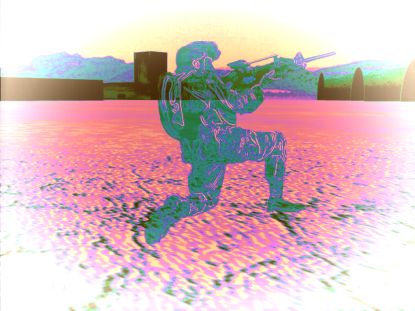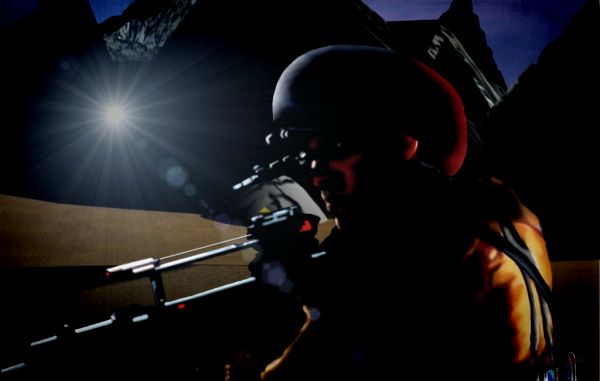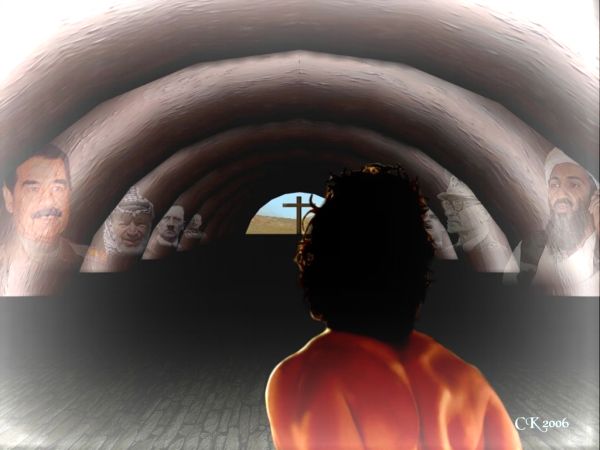

Marine Lieutenant David Abrams was a sniper with the 3rd Force Reconnaissance Company. He had the highest operational success rate of any U.S. soldier in the Iranian theatre, and coalition-wide there was only a single Scotsman with the SAS who had a better record.
And, right now, he was curled up on the floor in a dank cell somewhere in western Jerusalem where the only light came from a small opening high on one wall.
Occasionally he would cough up a mouthful of blood and phlegm from where the militia guards had battered in the left side of his chest. He was lucky to be alive; the ceramic insert in his Kevlar vest had probably kept the blows from being immediately fatal.
They had beat him, stripped him naked, and thrown him in this cell wearing only his dog tags. They had his rifle, of course. And they had the gadget.
What was left of the gadget anyway; he had heard the casing shatter when the guards fell on him. The scientists had warned him that breaching the containment isolating the strange quantum mechanism meant it would collapse into the non-space from which it was formed . . .
No going back even if his captors meant to spare him.
He was long past going back anyway.
He coughed up more bloody phlegm, wondering exactly how he would be executed.
Light from the hallway blinded him as the door opened. David blinked up at a rough silhouette and wondered if this would be his executioner.
David's visitor spoke in a rough, almost unintelligible accent, "You speak Hebrew?"
David laughed at the incongruity.
His visitor continued in Hebrew. "Do you understand me? Do you know why you're in this cell?"
"Waiting for you to kill me."
"Do you have any conception of what you've done?"
David looked into the shadowed face and tried to see an expression. He felt dizzy. Probably blood loss. "One bullet, I thought. One bullet and the gadget and there could be peace . . ."
"Peace?" his captor spat, as if it was the only word he could understand.
"Lieutenant Abrams, how would you like to be the man who ends this war?"
The man asking him the question was the secretary of defense of the United States.
It was the third week of the thrust toward Tehran, and David had been called back to the States by orders signed by the President herself.
Now he sat in meeting room, deep in the bowels of an unnamed DARPA campus in the Nevada desert. He faced the Chairman of the Joint Chiefs, the secretary, and a trio of scientists.
"What do you want me to do, sir?"
The secretary handed David a thick briefing book. "This is your target."
David opened the folder and saw a familiar bearded face. He looked up at the secretary. "But he's already dead."
The intel was perfect. The gadget dropped behind some sand dunes in the Afghan desert, 2000 yards from his target. It was frigid night, and the gadget was a weird weight on his back, pulling him like a gyroscope.
David staggered from the sudden change in orientation. Moments ago he had been standing on the concrete floor of an empty hangar in the DARPA complex. His feet now sank into sand, and he had the adrenaline shock of realizing that he was alone, in enemy territory.
He froze, praying his sudden appearance had gone unnoticed. It had; the desert night was quiet around him. After getting his bearings, he carefully lowered himself to his stomach and crawled with his weapon to just within sight of the impromptu camp. He brought his weapon to bear and looked through the scope, into the open tent.
The reality of what had happened didn't strike him until he saw Osama bin Laden's face in his crosshairs, laughing at something the Saudi prince with him was saying.
It wasn't until that moment that David truly believed what the scientists had told him. He really was in the Afghan desert in the year 1999. He really was here before 9/11, before the war in Afghanistan, before the invasion of Iraq. Before an unmanned drone invaded Iranian airspace to take Osama bin Laden out with a GPS-guided missile and spark the war with Iran.
In the words of the Chairman of the Joint Chiefs, "The gadget gives us the opportunity to revise that particular decision and eliminate OBL at a place chosen to be of maximum advantage to the United States and our allies."
For the first time in his career as a sniper, David's hand shook.
But only after he had pulled the trigger and OBL's laughing face melted into a red mist.
The shot echoed through the desert, followed by the popcorn sound of automatic weapons fire, interspersed with the occasional shout of Arabic.
He managed to press the red button that would take him back to the DARPA testing fields, a few milliseconds later than when he left.
Of all the consequences of eliminating OBL from the historical equation, David hadn't thought of the DARPA complex itself. Somehow, an irrational part of his brain half-expected to see the scientists, the chairman, and the secretary all there to greet him and to tell him what the last decade had wrought.
At first he thought that the gadget had dropped him in the wrong place and time, but his GPS locator placed him in the right area in Nevada. And the right time, a couple of seconds after he left.
But the DARPA complex was gone, and in its place was a sand-swept airstrip and a couple of dilapidated buildings that hadn't seen use since the sixties.
"I guess the project started after 1999 . . ."
David shook his head, a little mystified why killing bin Laden would prevent development of the gadget. But it began him thinking about other consequences.
No DARPA project and he never would have gone on the mission to hit OBL. That meant there was another David Abrams out here somewhere. Someone with his name, his face, but who had a completely different history since 1999. Would he have joined the Marines if 9/11 never happened? Was there any part of his life left?
David was prepared to die for his country, but somehow, this was worse.
He had to walk to the nearest town, carrying his weapon, preparing to be challenged at any moment by MPs or civilian police. He didn't know what would happen if he was picked up. He wasn't AWOL, but the only orders he had were signed by someone who might not even be President now.
He made it to a small diner, by the side of the road.
David always kept a few twenties in a pocket sewn under his vest. Never knew when American currency would come in handy. Good thing too. He was hungry.
He pushed his way into the near-empty diner.
The man behind the counter looked up and stared. "Good lord, where'd you come from?"
David, shook his head. "Long story. Can I get something to eat?"
"Sure." The man waved away his twenty. "Your money's no good here." He turned around and called out, "Sarah, get out our best steak dinner, got a serviceman here."
David took a seat at one of the barstools, fighting the weird gyroscope of the gadget. It was awkward, but he didn't want to set down a one-of-a-kind hundred billion dollar piece of equipment.
The man looked at him. "You're not the National Guard out of Vegas?" He looked a little surprised.
"No, Marines. Third Force Reconnaissance Company, out of Mobile."
"Uh huh . . . just got a truckload of National Guard, two days ago, heading for Ground Zero. That where you going?"
David shook his head, unsure of what the man had just said.
Ground Zero?
He must have taken silence as assent. "Thought so. I been telling everyone that there had to be some of those rag-head bastards running around here. How the hell else could they get a nuke into Vegas. You take a few out for me huh?"
David could only nod.
A steaming T-bone slid in front of him.
"On the house. Anyone who puts his life on the line for his country eats free here."
"Thanks." David looked at the meal. A nuke in Vegas? How the hell could . . . Taking out OBL should have been a death blow to al Qaeda.
David looked up and saw a TV, tuned to CNN.
"Can you turn that up?"
"Sure."
David ate mechanically in silence as he listened to what a balls-up failure his mission had been.
It wasn't just Vegas.
It was Vegas, New Orleans, and Chicago. The nukes were from Iran. At least that was the excuse for leveling Tehran and a dozen other cities. And Saddam had plowed into Iran, lobbing chemical shells, with tacit approval of the U.S. Casualty figures were reaching a two million. Ten times the war David had left.
Not counting the ones in the States.
No one had seen the attacks coming. Just like 9/11. But it was 9/11 with a decade more planning in the shadows of the Middle East.
The first time he saw the gadget, it was hard to believe they wanted to send something so fragile looking on a military mission. It didn't look like it, but it was the result of an effort that made the Manhattan project look like a couple of kids working in their dad's garage.
A cube of electronics connected to a metal framework holding a sphere that resembled a silver Christmas ornament the size of a bowling ball. It would fit into a canvas envelope that would strap to David's back instead of a normal pack.
"This is really a time machine?"
"Yes, it is," said one of the scientists.
"And it can go anywhere?" David asked.
"With some limits."
"What limits?"
"The coordinates where the device coalesces cannot co-occupy a point where the probability wave has—"
"In English?" David asked.
The scientist paused, taking a moment to phrase his explanation. "Any one device can't go to a point in time between any two points it has already traveled to."
The decade between OBL's corpse falling in the Afghan desert, and an Islamic nuke exploding in Vegas, was now inaccessible to the gadget. But the results were so catastrophic, David had no choice but to try to fix what he had done.
But there were only so many bullets, and he had to choose wisely.
Western presence in Saudi Arabia was one of the main driving factors behind OBL and his followers. If the U.S. hadn't come to drive Saddam out of Kuwait, they would lose their focus. The U.S. would not become involved in what was really a regional conflict.
So, if Iraq never invaded Kuwait . . .
David jumped a decade before his assassination of OBL, to Baghdad in 1989. And this time it is Saddam's face that evaporates in his crosshairs.

He knew the DARPA complex would not be there. And he knew his appearance would cause alarm, especially if he had achieved his goal and there was no longer an ongoing war. So this time he appeared after nightfall, inside a library in his home town.
He had night-vision equipment, so he was able to navigate through the green monochrome library, to the periodicals.
He picked up a newspaper and held his breath.
"Oh God. What did I do?"
He tore through more newspapers, magazines, and found the ugly history. An Iraqi civil war in the 90's, ignored by the U.S., eventually leading to an Iran-dominated Shiite theocracy that extended from Afghanistan to the gulf; one that ignored Kuwait, and chose to invade the Saudi peninsula.
The U.S. had no choice but to repel that aggression. Now, not only was the U.S. footprint on Saudi soil, M1–Abrams tanks were rolling through Mecca.
The level of terrorism in the U.S. over the past twenty years made the Gaza strip look like a frat party. Muslims were being herded into camps like the Japanese during WWII. Shiite clerics were disappearing into a black hole somewhere. Mosques were completely shut down, or being operated with government observers.
And over the past ten years, the casualty count rivaled that of the nuke attack.
Iran was the problem; really, the Islamic revolution there.
If there wasn't a dictator to revolt against. If a power shift happened in time to give the clerics and the students some hope that they'd have a voice in the government without a revolution. If the U.S. wasn't in a position to give the shah sanctuary and become the Great Satan.
By 1976, the shah was going to die soon anyway.
There's a law of unintended consequences . . .
The library was gone. David appeared in a lot of broken weed-shot asphalt. His old neighborhood was unrecognizable. Buildings abandoned, burnt out, boarded up and wrapped in graffiti. The sounds of gunfire and sirens echoed in the distance.
The GPS couldn't lock on any satellites. As if they weren't there anymore.
But he knew the area. He recognized the Shell station that had been there since he'd been a kid. It was boarded up too, and spray-painted over the plywood were the words "No Gas."
David shook his head and started looking for a newspaper.
He didn't stay long enough to discover all the details, but he got enough to understand how this history went wrong. No Iranian Revolution and no hostage crisis. Jimmy Carter might have a second term. Alter the U.S. attitude to the Soviets and the U.S.S.R. puts a little more effort into their push into Afghanistan. The Russians suffer an even worse military catastrophe—after cutting a swath of destruction through an Iran weakened by a succession of military coups.
Lebanon, Iran, Afghanistan, Iraq, Chechnya—a cauldron of civil wars spread out from the Russian invasion. The Soviet Union cracked apart, but not peacefully. The Israelis now occupied Sinai, all of Lebanon, part of Jordan. They were forcefully expelling the entire Palestinian population.
No the U.S. wasn't at war. But a third of the world was, and the U.S. was spiraling into a depression.
No, the root of it was the use of terror as a political tool. If it wasn't for the PLO, and Munich, things might have been different.
The next bullet was for Arafat in 1968.
Unintended consequences . . .
Palestinian refugees, without even a vague hope of repatriation, begin revolting against the Arab governments whose land they sit on. The weak Arab governments don't allow them a place in their countries. Eventually, like a malignant pearl, a fascist pan-Arab state grows around the violence of the of the refugee camps.
The next Arab-Israeli war is fought with nukes.
No Nasser, no Suez War, no Six-Day War. No Israeli occupation. In 1955 the Egyptian leader is cut down by David's bullet. . . .
Over half a century is too much history to glean from a newspaper, but bombs were going off in Tel-Aviv, and Damascus. UN forces were in the Sinai and Jordan, and a communist regime in Syria was refusing to dismantle its nuclear program.
If the British didn't abandon control of Palestine too early . . .
If there wasn't a Holocaust or WWII . . .
If the Ottoman Empire never fell . . .
If there wasn't the split between Sunni and Shiite . . .
If . . .
"Peace," his captor spat, as if it was the only word he could understand. The guard repeated, "Who are you? Why did you do this?"
"My name is Lieutenant David Abrams, United States Marine Corps Third Force Reconnaissance Company, Serial Number . . ." David repeated the mantra in English.
"Bah. Nonsense." The man threw him down and David coughed up more blood. "The man has lost his sanity."
A third man ran into the cell, "Josephus! The Romans are here for him. What should we do?"
Josephus rubbed the bridge of his nose and a grave expression shadowed his face, as if he could see the centuries of violence awaiting them all.
"Josephus?"
"We give them what they want. We give them the man and his unearthly tools, and hope the blood of Pilate's assassin will be enough to keep them from slaughtering us all."
Josephus looked down at David, who had lapsed into unconsciousness. "Peace?" He spat the word like a curse. "You'll have yours in the grave, like everyone else."

S. Andrew Swann is the author of many books and stories.